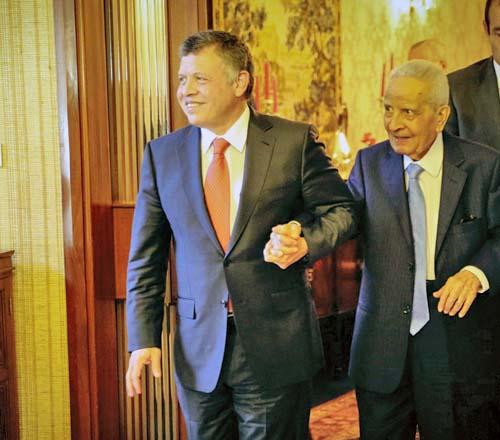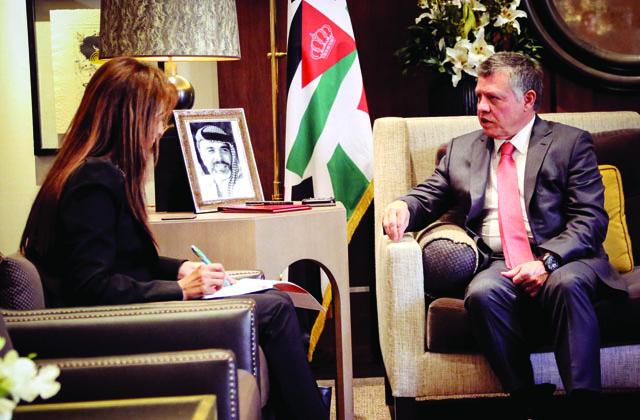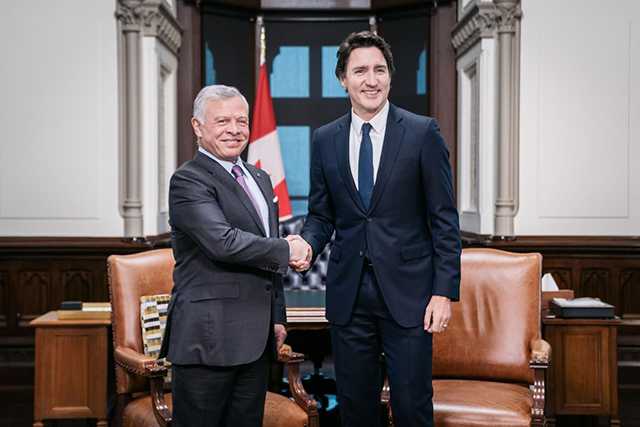You are here
‘Aggression on Gaza highlights need to end occupation’
By JT - Aug 10,2014 - Last updated at Aug 10,2014

AMMAN — What is happening in Gaza is “a Palestinian appeal to the entire world, calling for an end to occupation, destruction and killing perpetrated against a people seeking freedom, security and dignity”, according to His Majesty King Abdullah.
In an interview with Al Ghad Arabic daily, the King described the latest aggression on Gaza as “the bloodiest and most devastating in terms of casualties, especially among women, children and the elderly”.
“Entire families have been massacred,” he said in the interview, conducted by Al Ghad Editor-in-Chief Jumana Ghunaimat (see full text of interview).
“We will continue to use Jordan’s good relations with others, and its international presence at such forums as the UN Security Council and the UN Human Rights Council, to bring the aggression to a complete halt and... guarantee the success of efforts to reach a lasting truce,” His Majesty said.
He added that the Kingdom will also continue to “mobilise international efforts to rebuild Gaza and provide a conducive environment to relaunch conclusive final-status negotiations to reach a peace that is based on the two-state solution, relevant international terms of reference and the Arab Peace Initiative, and which fulfils the aspirations of the Palestinian people and honours the sacrifices of their martyrs”.
Answering questions on Syria, the King noted that “there is no immediate or military solution to the Syrian crisis and growing extremism complicates it further”.
“The developments we are witnessing are a recipe for disaster and intensify the spillover of the Syrian crisis into neighbouring countries. I fear that what is taking place in Syria is the beginning of a protracted phase of killing and destruction, which we have warned against repeatedly,” he added.
He stressed that the persistence of the Syrian crisis has turned extremism and the influx of militants from various countries into a major challenge facing the region and the world.
“However, attention should also be geared towards reaching a political solution that ends the suffering of the Syrian people rather than focusing all international attention on combating terrorism and extremism, which can only be stopped if the tragedy that has produced and nurtured it ends,” the King noted, calling for a unified Arab and international position that embraces a comprehensive political solution to the crisis.
Turning to the situation in Iraq, the Monarch said Jordan believes “in the unity and foresight of the Iraqi people and their ability to overcome challenges”.
“We believe that marginalising any component of the community means marginalising stability and giving way to extremism,” he added.
Despite the regional challenges surrounding Jordan, the King said the country has survived worse times.
“Jordan has been destined to be surrounded by challenges historically, and we have been able to face and overcome them. We have been through tougher circumstances than what we are dealing with today,” he said.
“Jordan is much stronger than some may think, and I have confidence in Jordan’s stability and resilience... Our institutions are working night and day to develop necessary plans to deal with various challenges,” added the King.
“Let us all remember that Jordan’s resilience, stability and international presence are not by coincidence. They are rather the fruits of decades of hard work and sacrifices based on the values of moderation, openness, respect of humanity and a genuine conviction among Jordanians that they are stakeholders in this endeavour,” he said.
This has all empowered Jordan to become an active player at international forums in building peace and promoting dialogue, according to His Majesty.
“It has also made Jordan an oasis of safety and stability, where those suffering from oppression and seeking safety, find dignity and shelter.”
On the national front, the King said those claiming that the situation in Maan are signs of internal weaknesses are mistaken.
“Maan and its citizens have contributed honourably to the founding of Jordan and its renaissance. Their patriotism is genuine and deeply rooted,” he noted.
“Unfortunately, a small, limited group of outlaws, who do not represent the people of Maan, have been distorting Maan’s reputation by breaking the law and undermining the standing of the state,” the King added.
This minority, he noted, has been disrupting the daily lives of Maanis and delaying the government’s implementation of the economic and development projects that the residents of the southern governorate have called for.
“It is imperative that public opinion in Maan rejects the practices of outlaws and isolates the perpetrators to support the efforts of security institutions in restoring law and order and bringing the calm necessary to push the wheel of development and investment forward, so that the governorate reaps the benefits it deserves,” His Majesty said.
Responding to a question on the Kingdom’s reform process, he underlined that Jordan’s reform path is guided by what Jordanians see as reform priorities and goals. “This brings to mind how, at the time when some Arab Spring countries were rushing to hold elections as a gateway to democratic transformation, Jordan was charting its own path and experience that meets its needs and builds on the cumulative achievements of our democratic institutions,” said the King.
“I don’t claim that the reform steps taken by other countries were wrong and that Jordan’s approach was the right one. It has, however, proved to be the best reform recipe for Jordan.”
As regional developments and repercussions of the Arab Spring continue to unfold, Jordan’s “home-grown evolutionary reform model proved prudent in its balance and gradualism”, with some looking to benefit from the Kingdom’s experience, the King said.
On the other hand, the “main reform challenge remains economic, particularly poverty and unemployment” — issues that top the priorities of all Jordanians, His Majesty said.
“I hear this again and again in my constant meetings and interactions with all Jordanians at various occasions, and after my long service in the Jordan Armed Forces, which has allowed me to see first-hand the challenges that the various segments of our society face and the lives that they lead. Securing the prosperity of my people and that of future generations is my top priority,” he said.
Responding to a question on the responsibilities he will assign to HRH Crown Prince Hussein after he graduates from university, the King said: “As I follow Hussein’s journey, I am delighted to see that his educational commitments have not kept him away from his sense of national duty or from following latest developments.”
“On the contrary, the knowledge and experience he is accumulating have motivated him and enriched his sense of responsibility,” His Majesty said, adding that he ensures that the Crown Prince has “full knowledge of the inner workings of decision making” and that he participates in local and international meetings to “enrich his leadership skills and experience,” qualifying him to assume his future responsibilities.
“As father and leader, I see in Hussein a Hashemite leader, well aware of his historical responsibilities and the inevitable evolution of the role of the monarchy in foreseeing the future,” noted the King.
“He will not sway from the historical role of the Hashemite Monarchy as a guarantor of the country’s stability, a uniting factor of all its components, and a driving force to advance reform, development and democratisation, guarantee justice, pluralism and freedoms, and work tirelessly to protect the country’s national security,” added His Majesty.
Related Articles
His Majesty King Abdullah on Wednesday reaffirmed that Jordan has always exhibited enough determination and ability to overcome emerging challenges of all kinds.
Following is the official translation of His Majesty King Abdullah’s interview with Al Ghad Editor-in-Chief Jumana Ghunaimat published on Sunday.
Ottawa — His Majesty King Abdullah and Canada Prime Minister Justin Trudeau on Friday held talks in Ottawa that covered bilateral ties and t



















